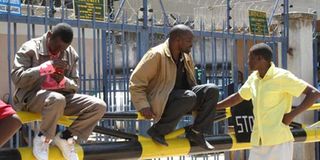Teachers posted to northern Kenya vow not to go back

Teachers who have refused to go back to their workplaces in Mandera camp outside TSC headquarters in Nairobi. They have called on teachers from other parts of the country to support their demands for transfers. PHOTO | JENNIFER MUIRURI | NATION MEDIA GROUP
What you need to know:
- Some of the teachers are camping at the Teachers Service Commission headquarters in Nairobi and have refused to resume work over insecurity in Mandera, Wajir and Garissa
- TSC secretary Gabriel Lengoiboni had said newly employed teachers would also be replaced if they failed to go back to work.
- More than 150 teachers are spending nights at the Kenya National Union of Teachers offices in Nairobi.
- At least 29 teachers were killed in Mandera in late 2014 in attacks that saw civil servants, including doctors, flee the region.
Teachers posted to northeastern are now calling on their colleagues in other parts to support their push for transfers.
Some of the teachers are camping at the Teachers Service Commission headquarters in Nairobi and have refused to resume work over insecurity in Mandera, Wajir and Garissa counties.
At least 300 teachers are staging a sit-in at the headquarters, where they have been for two weeks now.
The more than 2,000 teachers want their colleagues to go on strike in solidarity with them if the commission makes good on its threats to discipline those who will not have gone back to work next week.
Commission secretary Gabriel Lengoiboni had said newly employed teachers would also be replaced if they failed to go back to work.
“We will call on all teachers in the republic to go on strike in support of our cause,” said Mr John Nyongesa, who spoke on their behalf.
“We will not go back and we demand that the Teachers Service Commission issue us with redeployment letters,” added Mr Nyongesa, a teacher at Takaba Secondary School in Mandera.
“The cause we are fighting for is not political, it is a matter of life and death,” he said.
CAMPING AT KNUT OFFICES
Over 150 teachers are spending nights at the Kenya National Union of Teachers offices in Nairobi.
Female teachers sleep in the boardroom on the second floor while their male counterparts sleep on sixth floor.
“(There) are about 70 of us there and seven came with their children,” said Ms Nelly Makena, who came with her five-month-old daughter.
Ms Makena, a teacher at Elgal Primary School in Wajir, washes her baby’s clothes in the sinks and carries them to the compound, where she spreads them on the grass to dry as part of the protest.
At least 29 teachers were killed in Mandera in late 2014 in attacks that saw civil servants, including doctors, flee the region.
A teacher at Damasa Primary School in Mandera County said that he would not go back to that area even if he is offered a pay hike.
“The school is next to the Somalia border. We even teach children from Somalia as the school is on the no-man’s land. As much as the government is saying there is security, it is not the case on the ground,” said the teacher, who has taught there for two years.
SCHOOL PRONE TO ATTACKS
He says the school is prone to attacks as an Administration Police camp near the school was moved after the officers were attacked by Al-Shabaab. The teacher also added that inter-clan fights were aggravating the situation.
Another teacher from Shimbir Fatuma Secondary School in Mandera County, Obadia Sure, said he was traumatised as he had lost a friend on the ill-fated bus that was attacked and 28 people, most of them teachers, killed.
“With that trauma, can you really go back? I am the one who even advised this friend to come (and) teach in Mandera and now he is dead,” said Mr Sure.
Another teacher, from Kamoroi Liban Primary School in Mandera, vowed not to go back, saying that would be endangering his life.
“Going back would be a death mission. The teachers who lost their lives in the bus attack were killed just a few miles from where I teach. God saved me,” he said, adding that the incident had traumatised the teachers, who now, he said, needed counselling.




